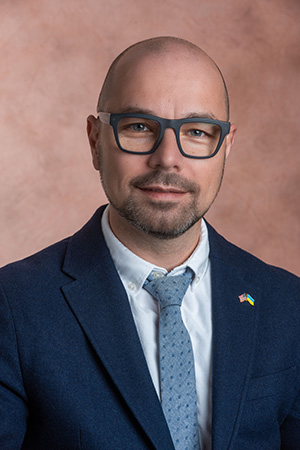
Throughout a career that has spanned nearly 20 years, Vitaliy Voytenko, PsyD, has embraced his professional identity as a practitioner-scholar – a researcher, educator, and clinical care provider whose scholarly activity and work with patients are mutually enriched and informed by one another.
Prior to coming to WMed in 2023 as an associate professor in the departments of Psychiatry and Medical, Ethics, Humanities, and Law, Dr. Voytenko built a research portfolio focused on psychosocial factors in difficult-to-treat depression, the intersection of mental health and religion/spirituality, and the collaboration between psychologists and psychiatrists within medical education toward more well-rounded training for students and resident physicians.
“When it comes to clinical training of our learners, a marker of collective success that I hope to contribute to is to produce psychiatrists who have a deep appreciation for the psychological and social determinants of mental health and who are well-prepared to engage not only at the level of the biological substrate but also able to use a more holistic approach that is informed by the patient’s identity.”
A native of Ukraine, Dr. Voytenko earned his bachelor’s degree in computer information systems from East Ukrainian State University in 1999 before moving to the United States. He received his doctorate in clinical psychology from Wheaton College in 2005 after completing a predoctoral internship at Harvard Medical School/Massachusetts Mental Health Center. He also completed a postdoctoral fellowship in college mental health at Boston College. In addition, Dr. Voytenko holds a master’s degree in general theology from Wheaton College.
Before his new role at WMed, Dr. Voytenko worked at Alliance Clinical Associates, a multidisciplinary mental health group practice in the west suburbs of Chicago and served as assistant professor and Director of Clinical Training in the Clinical Psychology Program at Wheaton College.
His new duties in Kalamazoo mark a return to Michigan for Dr. Voytenko. He previously lived in Grand Rapids for four years with his wife and two children while he provided clinical services, taught and supervised psychiatry residents, and led the development of a depression center-of-excellence, as well as a postdoctoral fellowship in clinical psychology at Pine Rest Christian Mental Health Services and Michigan State University College of Human Medicine. While at Pine Rest, Dr. Voytenko led a multidisciplinary team of psychiatrists, psychologists, social workers, and administrators to establish best-practice guidelines for treating adults with major depression.
Those guidelines, Dr. Voytenko said, were later adopted by the entire Pine Rest system in Michigan, which consists of 18 outpatient clinics throughout the state. He also helped lead a successful application for Pine Rest and MSU to join the National Network of Depression Centers (NNDC), a group of 26 leading academic health centers across the U.S., focusing on mood disorder care. At Pine Rest, he also developed a religion and spirituality in psychiatry curriculum for psychiatry residents and has taught residents there for several years. Additionally, through his expertise in treatment-resistant depression, Dr. Voytenko has led a working group that recently applied for – and received – a competitive grant from the NNDC to develop best-practice guidelines for the development of treatment-resistant depression consultation programs at academic health centers.
With all of his previous work and success, Dr. Voytenko said he is now focusing his efforts on teaching residents, caring for patients in his clinical practice, and working to establish a regionally and nationally recognized center-of-excellence for the treatment of depression and other mood disorders at WMed.
“Patients who live in this broader geographical area won’t have to travel outside the region to receive world-class care,” Dr. Voytenko said. Dr. Voytenko currently sees patients for psychotherapy at the WMed Health Psychiatry clinic and is accepting new referrals.
Dr. Voytenko said he plans to continue his scholarly work in treatment-resistant depression, psychodynamic approaches to treatment, and religion and spirituality in clinical care.
“I want to contribute to the success of WMed in increasing our research activity and contributions to the body of knowledge related to mental health,” he said. “Our collective efforts can help us address the lingering stigma related to mental illness and seeking mental health services and ultimately improve the health and flourishing of our communities.”
Notably, Dr. Voytenko said he hopes to expand his research focus to include post-traumatic stress with the goal of developing a robust clinical research program in his native Ukraine to help civilians, veterans, and active-duty service members in the Ukrainian military who have been affected by the ongoing war that began in early 2022.
“My desire to help people in my home country is propelling me to take a deeper dive into what, until recently, was a new field for me, that is, armed conflict-related PTSD,” Dr. Voytenko said. “I am actively seeking collaborations in Ukraine to develop a program of research to identify treatments that would be effective in the Ukrainian context, that do not require extensive training of providers, and could be brought up to scale quickly, as the needs on the ground are really great.”
